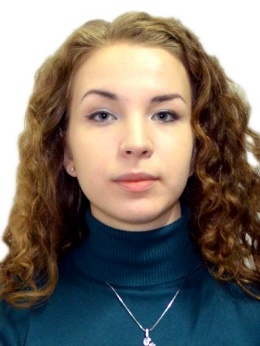Rogovtsova Svetlana Sergeevna
 E–mail: nordensvetra@gmail.com
E–mail: nordensvetra@gmail.com
Place of study: Saint Petersburg University
Status:  bachelor student of Department of English philology and translation
Scientific major: newspaper discourse, advertisement
 E–mail: nordensvetra@gmail.com
E–mail: nordensvetra@gmail.com
Place of study: Saint Petersburg University
Status:  bachelor student of Department of English philology and translation
Scientific major: newspaper discourse, advertisement
DOI 10.51955/23121327_2022_3_87
Abstract. The article is devoted to the analysis of the actualization of graphic means in the art discourse; the author focuses on the recurrent use of italics in thematic texts on art. The research material is English-language texts published in The Artist magazine, aimed at professional artists. The author emphasizes the pragmatic potential of graphic means in art discourse; it is aimed at drawing the addressee’s attention to significant pieces of information in the sphere of professional interaction between artists. The results of the research indicate the most common cases of italics‚Äô usage in the communication of artists. Taking into account the semantic and pragmatic features of this corpus of linguistic units, we have identified the following lexical groups: 1) proper names (the name of the artist, the title of the work, the name of the museum, the title of the exhibition, etc.); 2)¬†professional vocabulary (techniques and methods of painting, terms and their definitions, foreign words). Each presented group has its own frequency indicator within the analyzed sample.
Key words: art discourse, discursive markers, sign system, professional communication of artists, graphic means, italics, text, English.
Download article in PDF 376.5 kB
 E–mail: katemiletova@rambler.ru
E–mail: katemiletova@rambler.ru
Place of work: Federal State Budget Educational Institution of Higher Education ¬ęPyatigorsk State University¬Ľ, Pyatigorsk, Russia
Academic degree:  Candidate of Philological Sciences
Post: Associate Professor of the Chair of English Language and Professional Communication.
Specialty from nomenclature of scientific specialties (Code of Higher Attestation Commission): 10.02.04 ‚Äď Germanic languages
Scientific major: cognitive linguistics, terminology, discourse theory, different aspects of the professional communication language studies.
Important publications:
DOI 10.51955/23121327_2022_3_154
Abstract. This article offers a complex description of various research and analysis possibilities of project MONLOE ‚Äď innovative digitalized multifunctional¬† platform composed of texts, documents, and other types of information, devoted to a historical person Michel Montaigne. The research is conducted in the field of corpus and diachronic linguistics, that satisfy modern challenges of the humanities, and that deals with growing trends of digitalization (num√©risation), development of search tools and automatic analysis engines. Our particular interest to the project MONLOE is explained by its goals (to systematize and to digitalize a big data of texts) and also by its perspectives (to preserve and de reconstruct the XVIth century documents, archives, manuscripts, to upgrade search and auto-analysis tools). In detail we`ve presented search requests and formulas, various demonstration modes, and analytic possibilities in the six corpora ‚Äď components of MONLOE: literary texts corpora, fac-simil√©s corpora, Bordeaux edition, documents corpora, multimedia platform, and interactive library model.
Keywords: corpus linguistics, corpus-based analyses, corpora, automatic search, manuscript, TXM, MonLOE, Michel Montaigne.
Download article in PDF 417.0 kB
DOI 10.51955/23121327_2022_3_74
Abstract. The article is devoted to the author’s fairy tale for adults in dialect. The authors of the article aim to present and study in this fairy tale discourse the coexistence, mutual influence and joint functioning of the Hessian dialect and the literary German language.¬† The research material is a fairy tale for adults by Frank Fodderwestje ‚ÄúDornr√∂sjche un de b√∂se Froschk√∂nisch…‚ÄĚ, written by him in the Hessian dialect. The Hessian dialect dominates the fairy tale, and the German literary language clarifies the meaning of dialect words.¬† The author of the fairy tale includes literary German in the narrative only in cases that are particularly difficult to understand.¬† The local connectedness of the fairy-tale discourse with the Hessian territory is overcome thanks to literary words, and the fairy tale becomes accessible to all German-speaking readers. Thus, the author of the fairy tale seeks to attract as many readers as possible, including those who do not speak the Hessian dialect.
Keywords: dialect, literary language, fairy-tale discourse, author’s fairy tale, humorous effect.
Download article in PDF 372.3 kB
 E–mail:¬†ana.sh4drina@yandex.ru
E–mail:¬†ana.sh4drina@yandex.ru
Status: independent researcher
Scientific major: film discourse, film text, film dialogue, hybrid discourse, fairy tale film discourse, screen adaptations, German folktales, Grimms’ fairy tales, German stylistics.
Important publications:
DOI 10.51955/2312-1327_2022_3_33
Abstract. The purpose of this work is to determine the practical applicability of statistical methods for assessing the compliance of manufactured products with the requirements of regulatory documentation and substantiating the feasibility of strategic planning of their production range. The advantage of this study is the development of a universal algorithm for the system of applying statistical methods to control nonconforming products and reduce the number of defects caused by known and little-known causes. The reliability of the conclusions obtained is due to the results of experiments carried out as part of the technological process, the objects of which were cylindrical parts made by pressing from materials of various physical and chemical composition used in various industries: aviation, mechanical engineering, shipbuilding, defense, etc. 
Key words: statistical methods, quality of components, nonconforming products, requirements of regulatory documentation, flight safety.
Download article in PDF 533.0 kB
DOI 10.51955/2312-1327_2022_3_6
Abstract. The article presents an original formalizable logical-probabilistic model for the development of hazardous situations in flight, the use of which contributes to the deepening of the analysis of flight safety as a state of the air transport system, covering all its components and interfaces directly or indirectly involved, the current state of which determines the risk of an accident in each specific flight.
It is shown that the effectiveness of measures to reduce the risk of aviation accidents (prevention of aviation events) within the framework of the civil aircraft flight safety management system is largely determined by the level of organization, depth and quality of the investigation of aviation events.
The developed model is essential for organizing the collection of data and recording the results of aviation events investigation, as well as hazard and risk factors that pose a threat to the safety of civil aircraft flights. It allows you to implement a systematic approach to the investigation of aviation accidents, aviation incidents and their prerequisites, providing coverage of all directly or indirectly involved components of the air transport system and interfaces, the current state of which determines the risk of an accident in each particular flight.
The collection and registration of the results of the investigation of aviation events, data on hazard and risk factors for flight safety within the framework of the state system for managing the safety of civil aircraft flights on the basis of the developed model contributes to the fulfillment of the requirements of international and national legislation by all participants in the flight safety management process.
Key words: flight safety, dangerous situations, hazard factors, accident prevention factors, probability of development of a dangerous flight situation, investigation of aviation events.
Download article in PDF 585.3 kB
DOI 10.51955/23121327_2022_3_20
Ivan Stanislavovich Murav’ev
Abstract. Modern automated aircraft is a system with high information value of its operation parameters. The motor skill of the pilot in the flight control modes using autopilot and auto-throttle remains untapped on such types of aircraft. This leads to a lack of information about the aircraft state in flight and increases the risk of an emergency. To solve this problem, the authors developed a new method that allows pilots to evaluate the functioning of complex control systems, based on the formation of an integrated skill in combining static and dynamic parameters from various sources of information located in the cockpit. This method is based on a mathematical model for assessing the effectiveness of the operator’s activities and allows developing a methodology for training pilots to assess the functioning of automated aircraft systems and the state of the aircraft itself in flight.
The method consists in the fact that when performing a flight in the semi-automatic control mode, the pilot must partially replace the autopilot with manual piloting. By executing the commands set on the flight mode control panel, the pilot is partially dependent on the operating conditions of the automatics involved in operation. The theoretical calculation shows that the flight should be divided into specific stages, and the parameters of the information sources presented to the pilot in flight should be divided into static and dynamic ones. When training, it is necessary to stepwise increase the information load on the pilot through the static parameters of the information sources, requiring the student to withstand them by influencing the dynamic parameters. It is also necessary to gradually change the level of automation of the piloting mode.
The results of the experiment made it possible to determine that the participants of the experimental group were 24% more effective in performing the flight when moving from a flight with a high degree of automation to a flight with a minimum degree of automation. The processing of the experiment results showed that using the proposed preparation method when evaluating the functioning of automated aircraft systems provided the statistically significant efficiency.
Keywords: information, efficiency, evaluation of functioning, piloting, method, experiment.
Download article in PDF 326.8 kB
 E–mail: dmitriy.shiryaev@utair.ru
E–mail: dmitriy.shiryaev@utair.ru
Place of employment: PJSC UTair Aviation. Moscow, Russia.
Position: engineer-inspector for the investigation of aviation accidents, aviation incidents and preconditions for them. Honored Pilot of the Russian Federation.
Scientific major: management of functional reliability and aircraft crews’ training, human factor, air transport operation, examination of flight safety, investigation of aviation accidents and incidents.
Important publications: